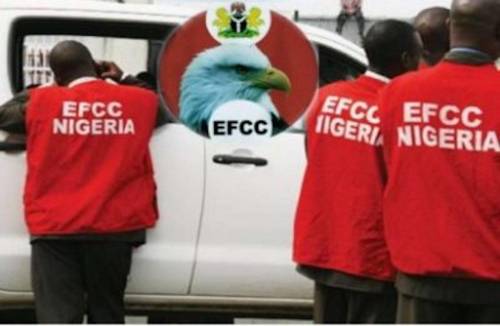
The Economic and Financial Crimes Commission (EFCC) has arrested 792 suspects linked to large-scale investment and cryptocurrency-related fraud schemes across Nigeria.
The Commission’s Chairman, Ola Olukoyede, disclosed this on Thursday in Abuja during a press briefing marking his second anniversary in office. He was represented by the Director of Public Affairs, Wilson Uwujaren.
Olukoyede revealed that the crackdown — described as one of the Commission’s biggest anti-cybercrime operations — led to the arrest of 192 foreign nationals alongside their Nigerian collaborators, who were prosecuted for cyberterrorism and cryptocurrency fraud.
“Another notable arrest and prosecution was the case of 792 investment and cryptocurrency fraud suspects apprehended in a sting operation in Lagos in December 2024. The syndicate included 192 foreigners, who have since been prosecuted and deported,” Olukoyede said.
He stressed that the operation sends a strong message that Nigeria will not serve as a safe haven for international cybercriminals.
“This development conveys a clear message: Nigeria will not tolerate foreigners turning it into a hub for cybercrimes,” he added.
Impressive Two-Year Record
According to data released by the EFCC, between October 2023 and September 2025, the Commission received 19,318 petitions, conducted 29,240 investigations, filed 10,525 cases in court, and secured 7,503 convictions.
Olukoyede said the figures reflect the agency’s strengthened focus on complex financial crimes, including cyberfraud, investment scams, and money laundering.
He further revealed that within the two-year period, the EFCC secured the forfeiture of 1,502 real estate assets, comprising 402 in 2023, 975 in 2024, and 125 so far in 2025.
Among the most notable recoveries were 753 duplex units in Lokogoma, Abuja, and Nok University, which has been renamed the Federal University of Applied Sciences, Kachia, Kaduna State.
“The total forfeited assets in two years stand at 1,502 properties. These include 753 duplexes in Lokogoma and the forfeiture of Nok University, now Federal University of Applied Sciences, Kachia,” the EFCC Chairman stated.
Massive Asset Recovery
Olukoyede also announced that the EFCC recovered ₦566.3 billion and several foreign currencies during the period under review.
“Under my watch, the Commission recovered ₦566,319,820,343.40, $411,566,192.32, £71,306.25, €182,877.10, CAD $5,510.00, AUD $740.00, ¥89,859.00, ₹1,300.00, CFA 8,381,375.00, AED 70.00, SAR 310,265.00, GH₵ 225.00, R 50.00, and ₩73,000.00,” he said.
The EFCC chairman reaffirmed the agency’s unwavering commitment to fighting cyber-enabled crimes and recovering stolen assets, adding that these efforts are vital to restoring integrity, transparency, and public trust in Nigeria’s financial system.
“Our goal remains clear — to protect citizens from financial predators, strengthen regulatory compliance, and ensure that criminal proceeds are traced, recovered, and returned to the rightful owners,” Olukoyede said.
Rising Wave of Digital Fraud
Nigeria has witnessed a sharp increase in investment and cryptocurrency-related scams in recent years, with victims losing billions of naira to fraudulent online trading platforms.
Many of these schemes disguise themselves as legitimate investment ventures, often promising unrealistic returns and using social media influence to lure unsuspecting investors.
The EFCC’s latest crackdown signals a renewed national effort to dismantle such networks and reinforce Nigeria’s stance against financial crimes in the digital economy.



